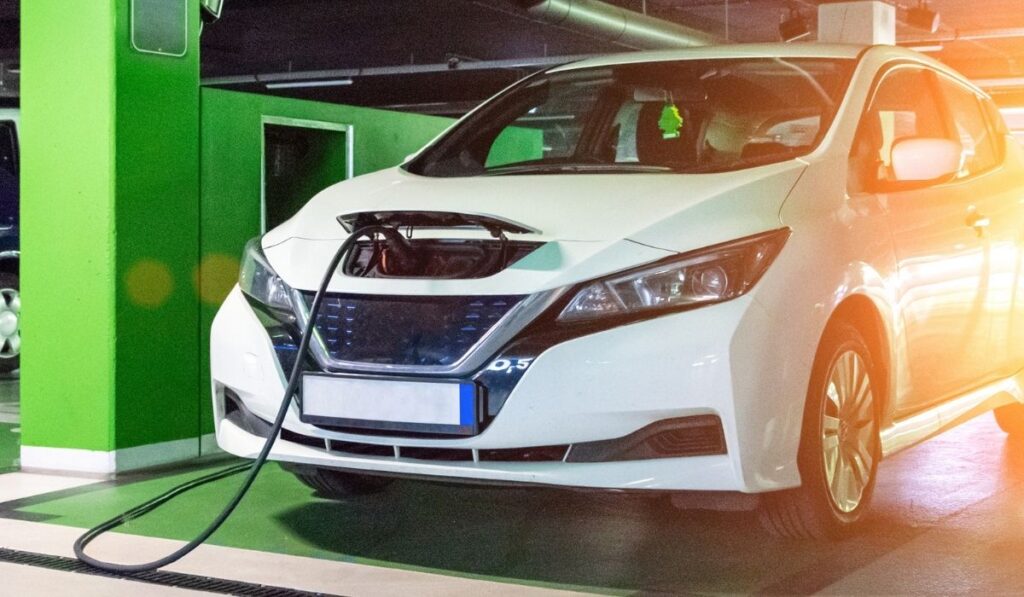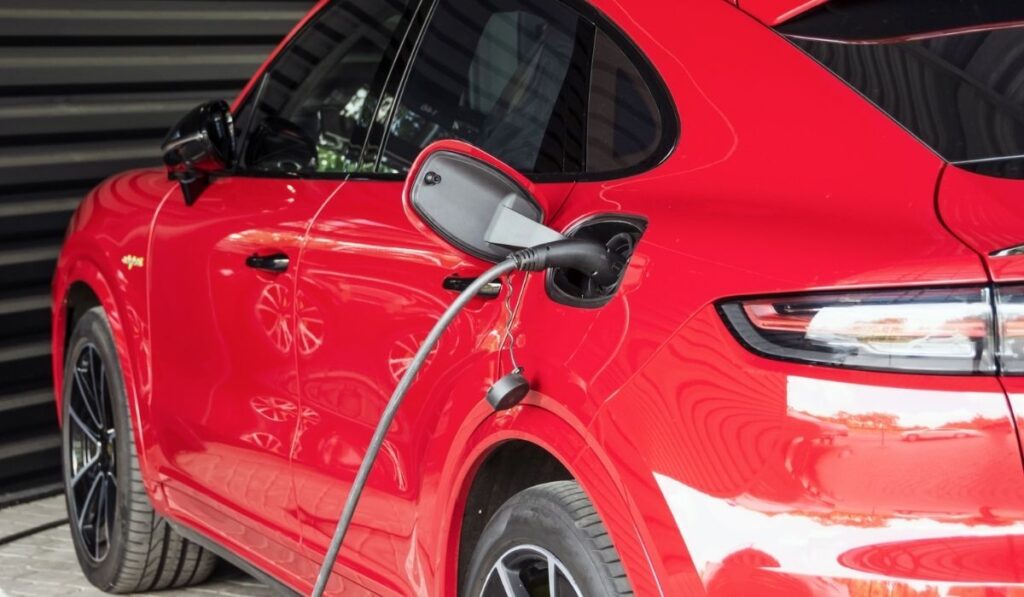Electric and hybrid vehicles are an increasingly common sight on the streets these days, but do you know what differentiates one from the other? And which one is right for you? What does Hybrid mean anyways?
Electric cars run on electricity, while hybrids use both electric motors and a gasoline engine. If you take frequent long trips requiring fueling-up mid-transit, a hybrid option is better because refueling is as easy as filling up the tank. EVs take time to recharge, limiting continuous range.
Although hybrid cars seem to have the best of both worlds, are they the right choice for you? Finding the answer isn’t so simple. But you’re in luck! We’ve compiled everything you need to know about all-electric and hybrid vehicles so that you can make the best choice for your needs.
What Is an Electric Car?

What images come into your head when you think of an electric car? The answer is probably close to an all-electric vehicle, or EV. All-electric vehicles rely solely on an electric motor, and don’t contain an internal combustion engine of any sort. All-electric cars contain large traction battery packs that supply the motor with power.
It’s necessary to plug EVs into a wall outlet or charger, commonly known as electric vehicle supply equipment. The benefit of all-electric vehicles is that they don’t emit exhaust fumes.
They also don’t require standard liquid fuel components such as fuel lines, fuel tanks, or fuel pumps.
What Is a Hybrid Car?
Hybrid cars are a different from all-electric and traditional fuel-powered vehicles. Hybrid cars typically use two engines for power: one gasoline and one electric. The two systems work in tandem to spin the wheels and accelerate the vehicle.
By using these two systems, less gasoline is burned, resulting in better fuel economy. Here are some key components of hybrid vehicles:
- Internal combustion engine
- Electric traction motor
- Electric generator
- Traction battery pack
Hybrid vehicles offer better power and fuel efficiency, and produce fewer emissions than traditional cars. Hybrid cars can also utilize regenerative braking to charge their batteries, resulting in even more fuel efficiency.
List of Hybrid Cars
Here are some of the most popular hybrid car models to give you a better idea of what these vehicles look like and their capabilities:
- Honda Insight
- Toyota Corolla Hybrid
- Ford Fusion Hybrid
- Honda Accord Hybrid
- Ford Escape Hybrid
- Honda CR-V Hybrid
- Toyota Camry Hybrid
- Toyota Prius
- Toyota Highlander Hybrid
- Toyota RAV4 Hybrid
How Do Hybrid Electric Cars Work?
How a hybrid electric car works depends on the type, make, and model. There are two main types of hybrid vehicles: plug-in (PHEVs) and hybrid electric vehicles (HEVs). Let’s break down the two options a bit further to give you a better understanding of how these systems work.
Plug-In Hybrid Electric Vehicles (aka “PEVs”)
A plug-in hybrid electric vehicle, or PHEV, contains an electric motor as well as an internal combustion engine (ICE). These vehicles use batteries to supply their electric motors with power.
They can also be plugged in and charged using outlets or charging equipment. They make use of regenerative brakes as well. Plug-in hybrid cars also use petrol to run the standard engine. These vehicles switch from electric power to the internal combustion engines when the electric batteries are close to dead.
Hybrid Electric Vehicles (aka “Hybrids”)
The other type is hybrid electric vehicles, or HEVs. These models utilize both an internal combustion engine and an electric motor. The main difference is that HEVs cannot be plugged into an outlet or any charging equipment. Instead, the batteries are charged via regenerative braking and the standard engine.
HEVs have the benefit of extra power from the electric motor. This allows for a smaller engine. The battery, electric motor, and internal combustion engine work in tandem for better gas efficiency and performance.
What Are the Advantages and Disadvantages of Hybrid Cars?
Hybrid cars are a step in the right direction toward all-electric vehicles. Hybrid vehicles have advantages, disadvantages, and best-use cases. Understanding these factors is one of the first steps you can take to determine whether a hybrid car is right for you and your circumstances.
Advantages of Hybrid Cars
Cleaner Exhaust: Hybrid cars are generally better for the environment when compared to traditional vehicles with internal combustion engines. Hybrid vehicles use both electric and internal combustion engines, reducing emissions in the process.
Less Fuel Dependency: Because hybrid cars have an electric motor, they don’t require as much fuel. Plug-in models can be charged, reducing the costs of fuel even further. In certain cases, this can save you money down the line.
Smaller and More Efficient Engine: Hybrid vehicles typically have smaller engines, reducing the size of the vehicle and the need for gasoline. The electric motor compensates for the smaller engine size as well.
Regenerative Braking: Most hybrid cars have regenerative braking. This means every time the brake is pressed down, the motor is slightly recharged. This system can reduce the amount you have to charge the battery and the amount of gas consumed.
Disadvantages of Hybrid Vehicles
Decreased Performance: The main advantage and primary focus of a hybrid car is the increased fuel efficiency. The trade-off is that hybrid vehicles typically have lower performance and less power than standard internal combustion engines.
These vehicles often have slower acceleration speeds and less engine strength.
High Upfront Costs: Although hybrid and electric vehicles are gradually becoming more affordable, they’re still more expensive than traditional cars, on average.
Hybrid vehicles may be out of some consumers’ price range or require additional financing.
Expensive Maintenance Requirements: Hybrid vehicles have two engines: one electric and one internal combustion engine. This means there are more internal components to maintain and repair. Hybrid cars typically have higher maintenance costs than traditional vehicles.
Additionally, not all mechanics or auto shops can repair hybrid models.
Do I Need a Hybrid or Electric Car?
Trying to decide between hybrid and electric cars can be pretty tough. Although these two types of vehicles share certain features, they both have advantages, disadvantages, and best-use cases. Here are some of the key differences between hybrid and electric cars:
Upfront Costs
The upfront costs of an electric vehicle and a hybrid will differ depending on a variety of factors. It’s hard to pinpoint the exact differences due to these factors, but we’ll try to give you a better idea of what you can expect.
The top three hybrid cars listed on Edmunds have an average price of around $30,500. On the flip side, the top three all-electric vehicles have an average cost of around $46,400.
Keep in mind that these are just rough estimates and don’t factor in the whole picture. However, it’s safe to say that all-electric vehicles generally have a higher upfront cost than hybrid cars.
Gas Costs
All-electric vehicles don’t require fuel to travel. These types of vehicles are plugged in and charged. Hybrid vehicles, whether they’re plug-ins or not, will require some degree of gasoline. With gas prices frequently changing, this can be a positive or negative attribute to consider.
It’s hard to predict the exact savings you might expect with a hybrid car compared to a traditional internal combustion engine. However, hybrid cars require gasoline and typically have a better fuel economy.
Charge Times

All-electric vehicles need to be charged in order to operate; there’s no way around it. Depending on the battery, model, and manufacturer, the charge time can be anywhere from 30 minutes to 12 hours. The average is anywhere from 6 to 10 hours for a full charge on an electric vehicle.
Hybrid vehicles have the option of gasoline, which means you can save time on charging. Even plug-in hybrid cars use gasoline, so you won’t have to rely solely on battery power. This is a distinct difference between the two vehicle options.
If charge time is something that will impact your commute, routine, and day-to-day life, you might be better off with a hybrid vehicle.
Range
Because all-electric vehicles run on batteries, they also have a limited range they can travel. All-electric vehicles can travel anywhere from 100 to 200 miles per charge, on average. Some new and upcoming models are boasting ranges of 300 miles, but only time will tell if that’s accurate.
Hybrid vehicles have extended ranges due to the internal combustion engine. Hybrid cars use both electricity and gasoline, so they don’t have to rely solely on the battery to get you from point A to point B.
If the range is a particularly important factor for you, you might prefer a hybrid. Longer commutes, frequent travels, or busy weeks might make charging an EV quite a challenge.
Maintenance
Maintenance is a factor you must consider when purchasing any vehicle. However, maintenance and servicing requirements are especially important when it comes to hybrid and all-electric vehicles.
All-electric vehicles need special maintenance compared to traditional internal combustion engine cars. Maintenance can add unexpected expenses and inconveniences. Not to mention, you’ll need to factor in caring for the battery and preserving its longevity.
Hybrid vehicles may have fewer maintenance requirements and costs than all-electric alternatives. However, hybrid cars still generally have higher maintenance costs than standard internal combustion engine vehicles.
You might have to visit specialty shops and dealers or have parts shipped in when servicing a hybrid or all-electric vehicle. These are factors to think about when considering whether a hybrid, all-electric, or traditional vehicle is right for you.
The Final Verdict
So, which is better? Are all-electric vehicles faster, more powerful, and more expensive than hybrid cars? Maybe. However, it’s hard to say which option is best. Each of these vehicles has advantages, disadvantages, and cases where they outperform the others.
All-electric vehicles are generally more expensive than hybrid models, with higher upfront costs. However, these vehicles will have limited ranges and require frequent charging that can last upwards of 12 hours.
Hybrid vehicles don’t have range issues due to the internal combustion engine but might be less powerful and have various maintenance requirements. The best vehicle for you is going to come down to your driving habits, budget, and personal preferences.
Be sure to do your due diligence and research the topic further to make the best purchase possible.

דירות דיסקרטיות בתל אביב
Sunday 4th of September 2022
Excellent post. I certainly appreciate this website. Keep writing!
דירות דיסקרטיות בקריות Israel night club
Thursday 18th of August 2022
Can I just say what a comfort to discover someone that actually knows what theyre discussing on the internet. You definitely know how to bring an issue to light and make it important. More people must check this out and understand this side of the story. I cant believe you arent more popular since you certainly possess the gift.